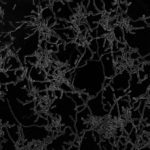Lien vers Pubmed [PMID] – 22997008
Lien DOI – 10.1002/pmic.201200228
Proteomics 2012 Nov; 12(21): 3164-79
The major fungal pathogen Candida albicans can occupy diverse microenvironments in its human host. During colonization of the gastrointestinal or urogenital tracts, mucosal surfaces, bloodstream, and internal organs, C. albicans thrives in niches that differ with respect to available nutrients and local environmental stresses. Although most studies are performed on glucose-grown cells, changes in carbon source dramatically affect cell wall architecture, stress responses, and drug resistance. We show that growth on the physiologically relevant carboxylic acid, lactate, has a significant impact on the C. albicans cell wall proteome and secretome. The regulation of cell wall structural proteins (e.g. Cht1, Phr1, Phr2, Pir1) correlated with extensive cell wall remodeling in lactate-grown cells and with their increased resistance to stresses and antifungal drugs, compared with glucose-grown cells. Moreover, changes in other proteins (e.g. Als2, Gca1, Phr1, Sap9) correlated with the increased adherence and biofilm formation of lactate-grown cells. We identified mating and pheromone-regulated proteins that were exclusive to lactate-grown cells (e.g. Op4, Pga31, Pry1, Scw4, Yps7) as well as mucosa-specific and other niche-specific factors such as Lip4, Pga4, Plb5, and Sap7. The analysis of the corresponding null mutants confirmed that many of these proteins contribute to C. albicans adherence, stress, and antifungal drug resistance. Therefore, the cell wall proteome and secretome display considerable plasticity in response to carbon source. This plasticity influences important fitness and virulence attributes known to modulate the behavior of C. albicans in different host microenvironments during infection.

